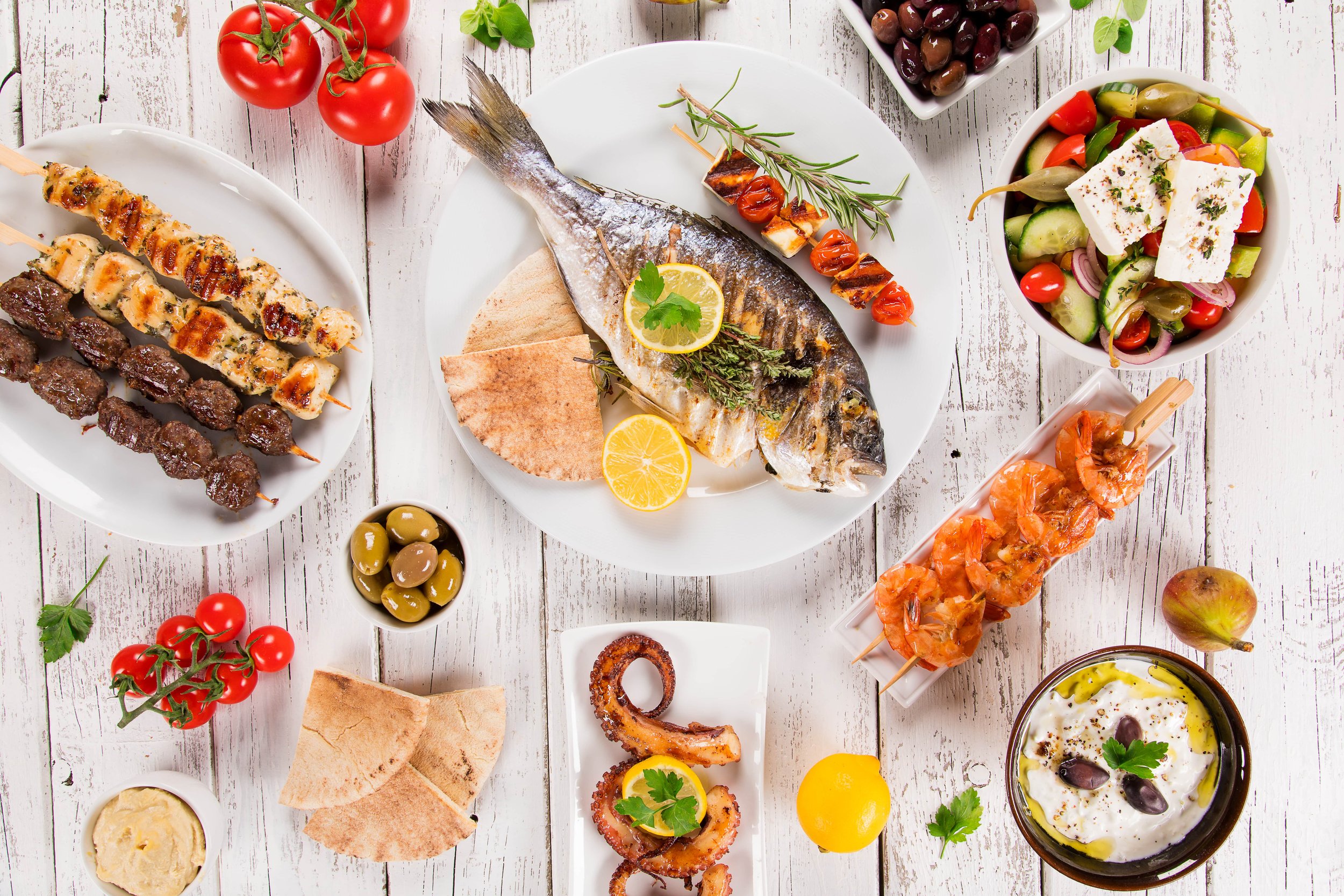Embark on a culinary journey throughout the captivating realm of Greek mythology meals. From the ambrosial nectar of the gods to the symbolic pomegranates of the underworld, each and every delicacy holds a fascinating story of nourishment, immortality, and cultural importance.
On this tantalizing exploration, we delve into the mythology surrounding those divine meals, uncovering their profound meanings and enduring have an effect on on Greek tradition and past.
Ambrosia and Nectar
Ambrosia and nectar, the divine food and drinks of the gods in Greek mythology, held profound importance within the realm of immortality and celestial sustenance.
Ambrosia, steadily depicted as a candy and aromatic substance, was once believed to grant everlasting adolescence and immortality to people who ate up it. Nectar, however, was once a refreshing and intoxicating beverage that invigorated the gods and maintained their divine powers.
Cultural References and Interpretations, Greek mythology meals
Ambrosia and nectar had been the topic of numerous cultural references and interpretations during historical past. In historic Greek artwork, they had been steadily depicted as golden or silvery liquids served in ornate cups or poured from celestial vessels.
In literature, ambrosia and nectar had been symbols of divine choose and immortality. Homer’s Iliad describes the gods feasting on ambrosia and nectar of their celestial domicile, Mount Olympus.
Pomegranates
In Greek mythology, pomegranates hang profound symbolic and sensible importance. Their purple seeds constitute fertility, abundance, and everlasting existence, making them sacred to Persephone, the goddess of the underworld.
Persephone and the Pomegranate
The parable of Persephone’s abduction via Hades, the god of the underworld, is central to the symbolism of pomegranates. After her go back to the outside global, Persephone was once compelled to spend part the yr with Hades because of having ate up six pomegranate seeds whilst within the underworld.
Those seeds certain her to the world of the lifeless, making sure her cyclical go back.
Inventive Representations and Cultural Interpretations
Pomegranates had been depicted broadly in Greek artwork and literature, symbolizing more than a few sides of existence and demise. In sculpture and portray, they steadily enhance Persephone’s determine or are held via her as an emblem of her connection to each the underworld and the arena above.
- The statue of Persephone from the Eleusinian Sanctuary in Athens (fifth century BCE) depicts her keeping a pomegranate, emphasizing her twin nature.
- In Homer’s Odyssey, pomegranates are described as rising within the lawn of Alcinous, an emblem of abundance and hospitality.
Honey: Greek Mythology Meals
In Greek mythology, honey holds vital significance as an emblem of purity, sweetness, and nourishment. It’s intently related to particular gods and performs a very important function in spiritual rituals.
Honey is especially connected to the goddess Artemis, who’s steadily depicted with bees swarming round her. Because the goddess of the search and nature, Artemis represents the untamed and pristine sides of the arena, and honey symbolizes the beauty and bounty that nature supplies.
Spiritual Importance
Honey was once an crucial providing in lots of Greek spiritual ceremonies. It was once believed to be a natural and sacred substance that might appease the gods and produce excellent fortune. In rituals honoring Zeus, the king of the gods, honey was once steadily poured over the sacrificial animals as an emblem of purification and devotion.
Honey was once extensively utilized within the Eleusinian Mysteries, a secret spiritual cult devoted to the goddess Demeter and her daughter Persephone. The initiates of those mysteries would eat a mix of honey and water as a part of their purification rituals, believed to cleanse their our bodies and souls.
Symbolism
Past its spiritual importance, honey additionally carries deep symbolic meanings in Greek tradition. It represents:
- Purity and Innocence:Honey’s candy style and golden colour had been related to purity and innocence.
- Sweetness and Pleasure:Honey’s herbal sweetness made it an emblem of pleasure, happiness, and abundance.
- Nourishment and Sustenance:Honey was once a treasured supply of power and nourishment, representing existence and power.
Honey’s symbolism extends to language and literature. The Greek phrase for honey, “meli,” is steadily used metaphorically to explain one thing candy, delightful, or fascinating.
Wine

Wine performed an important function in Greek mythology and tradition. It was once intently related to Dionysus, the god of wine, revelry, and fertility. Dionysus was once believed to have taught humanity the artwork of winemaking, and his fairs had been steadily celebrated with copious quantities of wine.In
historic Greece, wine was once an crucial a part of day-to-day existence. It was once ate up at foods, utilized in spiritual ceremonies, and served as a type of foreign money. Wine was once additionally an emblem of hospitality and friendship, and it was once steadily presented to visitors as an indication of welcome.The
symbolism and metaphorical meanings related to wine in Greek literature and artwork are huge and complicated. Wine can constitute pleasure, party, and fertility, however it may well additionally represent chaos, extra, and destruction. Within the Odyssey, as an example, Odysseus will get his males inebriated on wine to lend a hand them get away from the Cyclops Polyphemus.
Olives

Olives performed an important function in Greek mythology, symbolizing peace, prosperity, and fertility. They had been intently related to Athena, the goddess of knowledge, who was once stated to have proficient the olive tree to the folk of Athens.
Olives had been an emblem of victory and peace. The olive wreath, referred to as the kotinos, was once awarded to victors within the Olympic Video games. The olive department was once additionally an emblem of peace and was once steadily carried via messengers despatched to barter peace treaties.
Financial and Cultural Importance
Olives had been additionally a very powerful financial useful resource in historic Greece. Olive oil was once used for cooking, lighting fixtures, and cosmetics. Olives had been additionally eaten as a meals supply and had been a staple within the Greek nutrition.
The cultivation of olives was once popular in historic Greece, and olive groves had been a commonplace sight within the nation-state. Olives had been a very powerful a part of the Greek economic system, and olive oil was once one of the most primary exports.
Figs
/eating-like-an-ancient-greek-1705715_Final-69e9c17df9a24cca8d89bdc2ae4f8f6f.png)
Figs hang vital symbolism in Greek mythology, intently related to particular deities and representing issues of fertility, abundance, and wonder. Their use prolonged past nourishment, taking part in a very important function in spiritual rituals and cultural practices.
Affiliation with Gods and Goddesses
Figs had been sacred to Dionysus, the god of wine and revelry. They had been steadily depicted in his art work and rituals, symbolizing his affiliation with fertility and abundance. Moreover, figs had been connected to Demeter, the goddess of agriculture and harvest, as they represented the end result of her exertions and the abundance of the earth.
Symbolism of Fertility and Abundance
Figs are famend for his or her prolific enlargement and ample fruit manufacturing. In Greek mythology, this abundance was once noticed as an emblem of fertility and prosperity. Figs had been steadily used as choices to deities to invoke their blessings for bountiful harvests and the expansion of households.
Spiritual Rituals and Cultural Significance
Figs performed an important function in spiritual rituals and cultural practices in historic Greece. They had been used as choices to gods, symbolizing the beauty and abundance that was once desired. As well as, figs had been ate up all over fairs and celebrations, representing the enjoyment and abundance related to those occasions.
FAQ Information
What’s the importance of ambrosia and nectar in Greek mythology?
Ambrosia and nectar are the divine food and drinks of the gods, granting them immortality and everlasting adolescence.
How are pomegranates hooked up to the underworld in Greek mythology?
Pomegranates are related to Persephone, the goddess of the underworld. Consuming their seeds binds her to the underworld for a part of each and every yr, symbolizing the cycle of seasons.
Why was once honey vital in Greek tradition?
Honey was once thought to be an emblem of purity, sweetness, and nourishment, and was once utilized in spiritual rituals and as a herbal sweetener.

